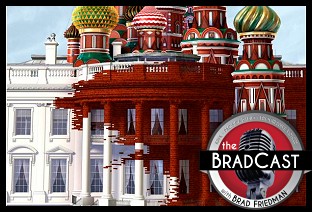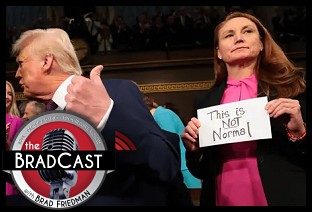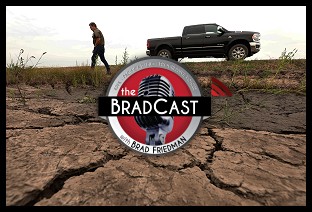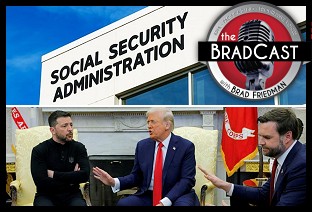READER COMMENTS ON
"CIA LEAK CASE: 'Jeff Gannon's' White House-Friendly Attacks on Joe Wilson"
(28 Responses so far...)
COMMENT #1 [Permalink]
...
Floridiot
said on 2/4/2007 @ 8:31 am PT...
I still haven't figured out whose bum is the sorest at the White House from all that 'penetration analyses' that was going on back then
COMMENT #2 [Permalink]
...
JUDGE OF JUDGES
said on 2/4/2007 @ 10:05 am PT...
Floridiot "bums" in the White House . . .
COMMENT #3 [Permalink]
...
Kathleen
said on 2/4/2007 @ 10:26 am PT...
John Conyers and Louise Slaughter obtained copies of Gannon/Guckert's sign in and outs from the SS. Those dates/ times should be examined and compared with dates for actual press conference and better yet, with dates the WHIG met. While we're at it, maybe even compare them with Monica's sign ins and outs, too.
COMMENT #4 [Permalink]
...
Larry Bergan
said on 2/4/2007 @ 1:34 pm PT...
Don't forget about those orgies Scalia was talking about. Those wouldn't have been in the oval office would they? Scalia didn't happen to be there on nights Gannon was checked in, was he?
No wonder Cheney wanted an office INSIDE the White House.
Seems suspicious that these quotes by Gannon at the press briefings are trying to steer the conversation in the exact direction Cheney wanted it to go at that time. That is - to distance himself from Wilson's involvement in the yellow cake investigation.
Interesting!
COMMENT #5 [Permalink]
...
Ram
said on 2/4/2007 @ 1:35 pm PT...
Well, we spent so many weeks here dissecting the 16 words that are now absolutely true.
Obviously enough people still believe this even today. Why else would the criminals still be in power?
Truth is what the neocons tell us truth is. I get so tired of feeling as though there is no effective remedy to cure this scourge. After all of the deceit, THEY ARE STILL IN POWER AND READY TO DESTROY THE MIDDLE EAST!
Truth is mighty and will prevail. There is nothing the matter with this, except that it ain't so. --Mark Twain
Maybe this giant lie that wraps itself around the White House --like kudzu in a Georgian woods-- will strangle the life out of the neocon agenda. If the truth isn't enough to bring them down, maybe their own lies will choke them off from the sun.
Everytime I watch one of them repeating their lies, I am going to imagine vines coming from their mouths and wrapping around their throats until the strands destroy the hosts.
COMMENT #6 [Permalink]
...
Larry Bergan
said on 2/4/2007 @ 1:38 pm PT...
Come on "mainstream media", Margie's giving you another chance to discover a salacious sex scandal in the white house.
Susan Page must be salivating!
COMMENT #7 [Permalink]
...
Shannon Williford
said on 2/4/2007 @ 3:18 pm PT...
Anybody know where "Jeff Gannon/Guckert" is these days? I wonder if he's alive...
Surely he's not still in the White House...
When the late, great Andy Stephenson was here in Nashville for the National Election Reform Conference in April of '05, he was saying that Jeff Gannon was actually Johnny Gorsh (sp?), the 10 year old boy that disappeared in the early '80s in the midwest and became the first milk-carton missing child.
Andy did a TV show (MSNBC, I think) from here in Nashville along with Johnny Gorsch's mom and they stated that "Gannon" was Johnny. The whole story was monstrously foul, involving a kidnapped little Johnny being part of a child sex slave ring based in Washington. On the show, "Gannon" would not deny that Gorsh's mom was his mom; he would only use slippery languaged when asked point blank, "Is that your mom?"
He said something like, "I feel very sorry for the pain this lady feels. She wants to see her son..."
A man who said he was Gorsh visited his mom in '97 for a mere few minutes. Ms. Gorsh was not sure that the man was her son, but she thought he might be. He told a tale of kidnapping, etc; and was worried that someone was watching and would kill him if they knew he was visiting his mom and talking. He told her he loved her and not to worry; and he might not see her again.
During the time White house fake journalist "Gannon" was tossing puffy softballs to the administration officials so that they could knock 'em over the fence, Gannon/Guckert's web site was called "Hotmilitarystud.com" and featured naked photos of him... Which was how Gorsh's mom recognized him, from a birthmark...
All a nasty tale; but indicative of the kind of people that the Repubs used to do their business...
Yeccchh, I feel slimed just thinking about such stuff; but feel that people need to be continually reminded about the horrible things that have happened under this administration. I hope some of the bad guys will see justice for their crimes one day...
shw
COMMENT #8 [Permalink]
...
Louis
said on 2/4/2007 @ 5:44 pm PT...
A male prostitute whoring his penis on the internet for all to see visits the WH several hundred times, is expose to high security materials, sits in the WH press corps --- that says it all folks.
We're talking bottom of the ditch here - perhaps the lowest point in American history. A goddamn whore sticking his prostituting ass right in our face on prime time.
And not a damn thing was done about it. We are truly in a despicable state - absolutely and totally disgusting.
COMMENT #9 [Permalink]
...
The Oracle
said on 2/4/2007 @ 7:36 pm PT...
I presume Patrick Fitzgerald's investigative team would have interviewed Jeff Gannon to find out who in the White House was giving Gannon his "talking points."
I know this doesn't have anything to do necessarily with Libby and the charges against him, but Gannon definitely was pushing OVP lies and spin at those press conferences.
In fact, I vaguely remember from several years ago as more information came out about the OVP's treasonous outing of a covert CIA agent, and coinciding with Gannon's leading questions, that someone asked whether Gannon had been called before the Fitzgerald grand jury to testify. However, I can't remember if he had.
COMMENT #10 [Permalink]
...
oldturk
said on 2/4/2007 @ 11:24 pm PT...
Shannon this is the web site "Jeff" is currently involved with to keep himself busy. He has I assume the desire to start/run a conservative web site that generates a traffic count comparable to Drudge Report.
http://www.jeffgannon.com/
........
Recent Entries, (Headlines of Articles)
Congress To Get Terrorist Surveillance Details
Bush 41 Cites Old Media Hostility
Kerry & Fonda - Betraying America Again
Russett Pleads Ignorance To Wilson-Plame Link
Farewell, Deborah Orin-Eilbeck
America, Iraq Kicking Insurgent A**
Anti-War Scum Desecrates Capitol Building
Harry Reid's Personal Culture of Corruption
Happy Anniversary To Me!
Plame Arranged Wilson Trip To Niger
.........
While Jeff Gannon/Guckert was attending the White House Press Conferences under the status of "guest" for Talon News Service out of Texas he was also involved in extra curricular activities. Some say these side jobs were of only a source of income of a personal nature. Others say he sexually prostituted himself at the White House to someone in the Bush administration too.
A record of Mr. Guckert/Gannon's escort/income/prostitution web site can be reviewed here,... (you might want to wear your rubber gloves
before activating this link.)
http://americablog.blogs.../02/man-called-jeff.html
COMMENT #11 [Permalink]
...
Joan
said on 2/4/2007 @ 11:42 pm PT...
#8
I could not agree with you more, Louis.
A friend just sent me this piece from The Progressive, by Howard Zinn, "Impeachment by the People"
http://www.progressive.org/node/4473
Some excerpts:
"...The Declaration of Independence, revered as a document but ignored as a guide to action, needs to be read from pulpits and podiums, on street corners and community radio stations throughout the nation. Its words, forgotten for over two centuries, need to become a call to action for the first time since it was read aloud to crowds in the early excited days of the American Revolution:
“Whenever any form of government becomes destructive of these ends, it is the right of the people to alter or abolish it and institute new government.”
"...True, no government in the history of the nation has been faithful to those ends...
...Still, there seems to be a special viciousness that accompanies the current assault on human rights, in this country and in the world. We have had repressive governments before, but none has legislated the end of habeas corpus, nor openly supported torture, nor declared the possibility of war without end. No government has so casually ignored the will of the people, affirmed the right of the President to ignore the Constitution, even to set aside laws passed by Congress..."
Zinn goes on to discuss the burgeoning impeachment movement...
".... Indeed, an actual “indictment” has been drawn up by a former federal prosecutor, Elizabeth de la Vega, in a new book called United States v. George W. Bush et al, making a case, in devastating detail, to a fictional grand jury.
"There is a logical next step in this development of an impeachment movement: the convening of “people’s impeachment hearings” all over the country. This is especially important given the timidity of the Democratic Party.
"Such hearings would bypass Congress, which is not representing the will of the people, and would constitute an inspiring example of grassroots democracy.
"These hearings would be the contemporary equivalents of the unofficial gatherings that marked the resistance to the British Crown in the years leading up to the American Revolution...
"...Impeachment hearings all over the country...could push reluctant members of Congress...to do what the Constitution provides for and what the present circumstances demand: the impeachment and removal from office of George Bush and Dick Cheney..."
Am I dreaming here? Is Zinn dreaming? I don't know about you all, but I'm REALLY tired of endless pointless talk from Washington. BLOOD is being spilled every day every day every day. And they talk and talk and talk and talk and talk. They will talk for the next two years. And then the next four years after the next rigged election. And the four years after that.
I'll go. I'll fucking go. Isn't it PAST TIME???
COMMENT #12 [Permalink]
...
oldturk
said on 2/5/2007 @ 12:21 am PT...
COMMENT #13 [Permalink]
...
Larry Bergan
said on 2/5/2007 @ 2:59 am PT...
Joan:
We are definitely at a crossroads. If the Republicans keep acting like patriarchal Gods, something is going to explode! It's going to get mighty ugly!
COMMENT #14 [Permalink]
...
Dredd
said on 2/5/2007 @ 5:28 am PT...
Yep, when even the brain dead rubber stamp leader can see the true picture of a very perverted presidency, and now neoConishly admit it, there is some blue sky.
However, now instead of following up on a story that a major deceit of the american people has taken place, they act as if everything is normal.
Un-freaking-believable ... but I believe it.
COMMENT #15 [Permalink]
...
big dan
said on 2/5/2007 @ 6:44 am PT...
OldTurk: Isn't it always the case, a "kinky homo" starts a "conservative" website? Does anyone get that that's the way it is? Ted Haggard, Mark Foley, etc...we can go on and on and on and on...and the idiot real conservatives don't tar and feather these guys, they QUOTE them!!! And make "excuses" for them!!!
COMMENT #16 [Permalink]
...
KestrelBrighteyes
said on 2/5/2007 @ 6:54 am PT...
Damn, sounds like there's little to no chance of JimmyJeff ever being put on the stand.
I was sooo looking forward to mainstream newspapers printing something about the White House Hooker, just so I could send the link to my evangelical pro-Bush relatives who are STILL hung up on Clinton's blowjob.
Maybe better luck when Fitz uses evidence uncovered in this trial to bring charges against Rove?
COMMENT #17 [Permalink]
...
Dredd
said on 2/5/2007 @ 7:39 am PT...
Violence is the child of war, untruth is its mother:
"Violence can only be concealed by a lie, and the lie can only be maintained by violence."
--Alexander Solzhenitsyn
And they are not discriminatory, violence by gays, lies by gays, "it is all good".
COMMENT #18 [Permalink]
...
czaragorn
said on 2/5/2007 @ 8:10 am PT...
Yeah, KBE - I thought I read somewhere that the old guckster used to boast that he could "make it stand up in court" - I can see why he'd get a pass on testifying, frankly!
COMMENT #19 [Permalink]
...
big dan
said on 2/5/2007 @ 10:16 am PT...
Jeff Gannon: "I'm inviting all you conservatives, to support new conservative websites like mine. We conservatives have to stick together, against liberals. We stand for family values. Please join me at 'www.BallMouthPlug.com', and support the party of family values, morality, and balanced budgets..."
COMMENT #20 [Permalink]
...
big dan
said on 2/5/2007 @ 10:18 am PT...
"...and support our war profiteers...OOPS! I mean 'our troops'"..........
COMMENT #21 [Permalink]
...
Joan
said on 2/5/2007 @ 12:47 pm PT...
#13
I dunno, Larry. I thought we were at a crossroads when the Abu Ghraib scandal broke. And the Downing Street Minutes, and warrantless wiretaps, after he'd JUST SAID how we need a WARRANT for wiretaps, you silly people! And oh yeah, the "lost" 9 billion dollars. And the outing of Valerie Plame. TREASON, for God's sake! And barely a whisper of consequence for any of it.
I almost feel like it's bad luck to say it but it is damn hard to imagine our government being more Kafkaesque than it already is.
It SICKENS me to think of the young men & young women over there in the sand & the mud in the middle of this horror, for these SICK FREAKS that are running the country.
Jesus, if any of them actually believe in God the way they say they do, I would think they would be absolutely terrified for their shriveled little souls.
COMMENT #22 [Permalink]
...
oldturk
said on 2/5/2007 @ 5:47 pm PT...
A fake , a fraud, and a fascist fool - with softball questions for bu$$hco.
2/2005
The conservative reporter who asked President Bush a loaded question at a news conference last month resigned yesterday after liberal bloggers uncovered his real name and raised questions about his background.
Jeff Gannon, who had been writing for the Web sites Talon News and GOPUSA, is actually James Dale Guckert, 47, and has been linked to online domain addresses with sexually provocative names.
He has been under scrutiny since asking Bush how he could work with Senate Democratic leaders "who seem to have divorced themselves from reality."
Link, click here.
COMMENT #23 [Permalink]
...
Lar Spears
said on 2/6/2007 @ 11:25 am PT...
Jeff Gannon is Johnny Gosch, but he's "Divorced from Reality" and doesn't want to accept the truth. It's as simple as 123
COMMENT #24 [Permalink]
...
Lar Spears
said on 2/6/2007 @ 11:33 am PT...
COMMENT #25 [Permalink]
...
oldturk
said on 2/6/2007 @ 2:34 pm PT...
COMMENT #26 [Permalink]
...
Doe-Ray-me
said on 2/7/2007 @ 12:55 pm PT...
COMMENT #27 [Permalink]
...
Renee Lamborn
said on 2/7/2007 @ 2:12 pm PT...
Jeff Gannon will be called by the court to answer for his actions, both as a prostitute for hire, and as someone who unlawfully provided aid and comfort to George W. Bush. He better hope he has some pretty powerful representation. The gavel wields no power for him because "pee" is his middle name.
http://www.quitsearching.com/images/mysins.jpg
COMMENT #28 [Permalink]
...
Polk Street X-press
said on 2/7/2007 @ 4:21 pm PT...
Jeffy Jeffy, you're the girl for me.
You don't know me but you make me so snappy
I tried to call you before but I lost my nerve.
I tried my imagination, yes you are disturbed.
Jeffy, I got your number,
I need to make you whine.
Jeffy, don't change your number,
8-6-7-5-3-0-9 (8-6-7-5-3-0-9)
8-6-7-5-3-0-9 (8-6-7-5-3-0-9)
I got it, I don't got it!
I got your number on the stall!
I got it, I got it!
For a gay (and I don't mean happy) time, for a gay time call....
****Jeffy Gannon******
 We do not have a political system of government by one man. By virtue of that fact, by definition the man at the top --- the president --- is responsible for what his people do. When former ambassador Joseph Wilson belatedly published demurrals about purported Iraq efforts to obtain uranium, in July 2003, CIA skepticism about the uranium story also gradually became known to the wider public. In simplest terms, what followed was that the White House including Cheney’s office launched a campaign not only against Wilson personally but also against offices within the CIA that still functioned in intelligence gathering and analysis.
We do not have a political system of government by one man. By virtue of that fact, by definition the man at the top --- the president --- is responsible for what his people do. When former ambassador Joseph Wilson belatedly published demurrals about purported Iraq efforts to obtain uranium, in July 2003, CIA skepticism about the uranium story also gradually became known to the wider public. In simplest terms, what followed was that the White House including Cheney’s office launched a campaign not only against Wilson personally but also against offices within the CIA that still functioned in intelligence gathering and analysis.

 Vets Push Back at Trump, Musk Plan to Slash Health Care, 80K V.A. Jobs: 'BradCast' 3/27/25
Vets Push Back at Trump, Musk Plan to Slash Health Care, 80K V.A. Jobs: 'BradCast' 3/27/25 'Green News Report' 3/27/25
'Green News Report' 3/27/25
 Signal Scandal Worsens for Trump, GOP; Big Election Victories for Dems in PA: 'BradCast' 3/26/25
Signal Scandal Worsens for Trump, GOP; Big Election Victories for Dems in PA: 'BradCast' 3/26/25 'Emptywheel' on Why Trump NatSec Team Should 'Resign in Disgrace' After Signal Chat Debacle: 'BradCast' 3/25/25
'Emptywheel' on Why Trump NatSec Team Should 'Resign in Disgrace' After Signal Chat Debacle: 'BradCast' 3/25/25 'Green News Report' 3/25/25
'Green News Report' 3/25/25 Postal Workers Union Prez: USPS 'Belongs to the People, Not the Billionaires':
Postal Workers Union Prez: USPS 'Belongs to the People, Not the Billionaires': Sunday 'Suddenly Conceivable' Toons
Sunday 'Suddenly Conceivable' Toons We're ALL Voice of America Now: 'BradCast' 3/20/25
We're ALL Voice of America Now: 'BradCast' 3/20/25 'Green News Report' 3/20/25
'Green News Report' 3/20/25 What Trump's 'Timber Production Expansion' Means (and Costs): 'BradCast' 3/19/25
What Trump's 'Timber Production Expansion' Means (and Costs): 'BradCast' 3/19/25 Courts Largely Holding Against Trump, Musk Lawlessness: 'BradCast' 3/18/25
Courts Largely Holding Against Trump, Musk Lawlessness: 'BradCast' 3/18/25 'Green News Report' 3/18/25
'Green News Report' 3/18/25 Chief VOA Reporter on Outlet Falling Silent First Time Since 1942: 'BradCast' 3/17/25
Chief VOA Reporter on Outlet Falling Silent First Time Since 1942: 'BradCast' 3/17/25 Sunday 'The Usual' Toons
Sunday 'The Usual' Toons 'Green News Report' 3/13/25
'Green News Report' 3/13/25 Trump EPA Unveils Plans to Endanger, Sicken Americans: 'BradCast' 3/13/25
Trump EPA Unveils Plans to Endanger, Sicken Americans: 'BradCast' 3/13/25 Trump Nixed Enforce-ment Against 100 Corp. Lawbreakers: 'BradCast' 3/12/25
Trump Nixed Enforce-ment Against 100 Corp. Lawbreakers: 'BradCast' 3/12/25 Bad Day for 'Strongmen': 'BradCast' 3/11
Bad Day for 'Strongmen': 'BradCast' 3/11 WI Election Could Flip Supreme Court Control, Musk Jumps In: 'BradCast' 3/10
WI Election Could Flip Supreme Court Control, Musk Jumps In: 'BradCast' 3/10 'What Else Could a Russian Asset Do That Trump Hasn't?': 'BradCast' 3/6/25
'What Else Could a Russian Asset Do That Trump Hasn't?': 'BradCast' 3/6/25 The Longest, Dullest, Most Lie-Filled 'SOTU' Ever: 'BradCast' 3/5/25
The Longest, Dullest, Most Lie-Filled 'SOTU' Ever: 'BradCast' 3/5/25 Trump Bad for Biz... and Farmers... and Nat'l Parks... and...: 'BradCast' 3/4/25
Trump Bad for Biz... and Farmers... and Nat'l Parks... and...: 'BradCast' 3/4/25 Trump Targeting 50% Cuts, Office Closures at Social Security: 'BradCast' 3/3/25
Trump Targeting 50% Cuts, Office Closures at Social Security: 'BradCast' 3/3/25
 VA GOP VOTER REG FRAUDSTER OFF HOOK
VA GOP VOTER REG FRAUDSTER OFF HOOK Criminal GOP Voter Registration Fraud Probe Expanding in VA
Criminal GOP Voter Registration Fraud Probe Expanding in VA DOJ PROBE SOUGHT AFTER VA ARREST
DOJ PROBE SOUGHT AFTER VA ARREST Arrest in VA: GOP Voter Reg Scandal Widens
Arrest in VA: GOP Voter Reg Scandal Widens ALL TOGETHER: ROVE, SPROUL, KOCHS, RNC
ALL TOGETHER: ROVE, SPROUL, KOCHS, RNC LATimes: RNC's 'Fired' Sproul Working for Repubs in 'as Many as 30 States'
LATimes: RNC's 'Fired' Sproul Working for Repubs in 'as Many as 30 States' 'Fired' Sproul Group 'Cloned', Still Working for Republicans in At Least 10 States
'Fired' Sproul Group 'Cloned', Still Working for Republicans in At Least 10 States FINALLY: FOX ON GOP REG FRAUD SCANDAL
FINALLY: FOX ON GOP REG FRAUD SCANDAL COLORADO FOLLOWS FLORIDA WITH GOP CRIMINAL INVESTIGATION
COLORADO FOLLOWS FLORIDA WITH GOP CRIMINAL INVESTIGATION CRIMINAL PROBE LAUNCHED INTO GOP VOTER REGISTRATION FRAUD SCANDAL IN FL
CRIMINAL PROBE LAUNCHED INTO GOP VOTER REGISTRATION FRAUD SCANDAL IN FL Brad Breaks PA Photo ID & GOP Registration Fraud Scandal News on Hartmann TV
Brad Breaks PA Photo ID & GOP Registration Fraud Scandal News on Hartmann TV  CAUGHT ON TAPE: COORDINATED NATIONWIDE GOP VOTER REG SCAM
CAUGHT ON TAPE: COORDINATED NATIONWIDE GOP VOTER REG SCAM CRIMINAL ELECTION FRAUD COMPLAINT FILED AGAINST GOP 'FRAUD' FIRM
CRIMINAL ELECTION FRAUD COMPLAINT FILED AGAINST GOP 'FRAUD' FIRM RICK SCOTT GETS ROLLED IN GOP REGISTRATION FRAUD SCANDAL
RICK SCOTT GETS ROLLED IN GOP REGISTRATION FRAUD SCANDAL VIDEO: Brad Breaks GOP Reg Fraud Scandal on Hartmann TV
VIDEO: Brad Breaks GOP Reg Fraud Scandal on Hartmann TV RNC FIRES NATIONAL VOTER REGISTRATION FIRM FOR FRAUD
RNC FIRES NATIONAL VOTER REGISTRATION FIRM FOR FRAUD EXCLUSIVE: Intvw w/ FL Official Who First Discovered GOP Reg Fraud
EXCLUSIVE: Intvw w/ FL Official Who First Discovered GOP Reg Fraud GOP REGISTRATION FRAUD FOUND IN FL
GOP REGISTRATION FRAUD FOUND IN FL


































